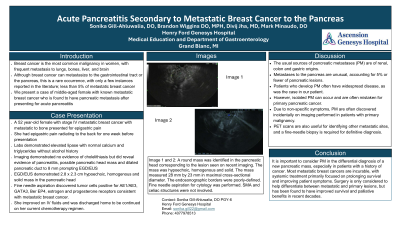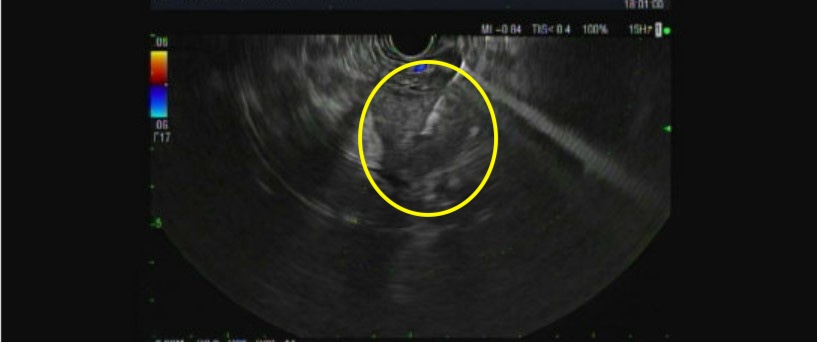Sunday Poster Session
Category: Biliary/Pancreas
P0100 - Acute Pancreatitis Secondary to Metastatic Breast Cancer to the Pancreas
Sunday, October 27, 2024
3:30 PM - 7:00 PM ET
Location: Exhibit Hall E

Has Audio
.jpg)
Sonika K. Gill, DO
Ascension Genesys
Rochester Hills, MI, MI
Presenting Author(s)
Sonika K. Gill-Ahluwalia, DO1, Brandon T. Wiggins, DO, MPH2, Divij K. Jha, MD3, Mark Minaudo, DO2
1Ascension Genesys, Rochester Hills, MI; 2Ascension Genesys Hospital, Grand Blanc, MI; 3Sparrow Hospital, Michigan State University, Lansing, MI
Introduction: Breast cancer is the most common malignancy in women, with frequent metastasis to lungs, bones, liver, and brain. Although breast cancer can metastasize to the gastrointestinal tract or the pancreas, this is a rare occurrence, with only a few instances reported in the literature. Less than 5% of metastatic pancreatic masses are from primary breast cancer. We present a case of a middle-aged female with known metastatic breast cancer who is found to have pancreatic metastasis (PM) after presenting for acute pancreatitis.
Case Description/Methods: 52 year old female with stage IV metastatic breast cancer with metastasis to bone presented for epigastric pain. She had epigastric pain radiating to the back for one week before presentation. Labs demonstrated elevated lipase with normal calcium and triglycerides without alcohol history. Imaging demonstrated no evidence of cholelithiasis but did reveal evidence of pancreatitis, possible pancreatic head mass and dilated pancreatic duct to 8 mm prompting EGD/EUS.
EGD/EUS demonstrated 2.8x2.3cm hypoechoic, homogenous and solid mass in the pancreatic head. Fine needle aspiration discovered tumor cells positive for AE1/AE3, GATA3, Ber EP4, estrogen and progesterone receptors consistent with metastatic breast cancer. She improved on IV fluids and was discharged home to be continued on her current chemotherapy regimen.
Discussion: The usual sources of PM are of renal, colon and gastric origins. Still, metastases to the pancreas are unusual, accounting for 5% or fewer of pancreatic lesions. Patients who develop PM often have widespread disease, as was the case in our patient. However, isolated PM can occur and are often mistaken for primary pancreatic cancer.
Due to non-specific symptoms, PM are often discovered incidentally on imaging performed in patients with primary malignancy. PET scans are also useful for identifying other metastatic sites, and a fine-needle biopsy is required for definitive diagnosis.
It is important to consider PM in the differential diagnosis of a new pancreatic mass, especially in patients with a history of cancer. Most metastatic breast cancers are incurable, with systemic treatment primarily focused on prolonging survival and improving patient symptoms. Surgery is only considered to help differentiate between metastatic and primary lesions, but has been found to have improved survival and palliative benefits in recent decades.

Disclosures:
Sonika K. Gill-Ahluwalia, DO1, Brandon T. Wiggins, DO, MPH2, Divij K. Jha, MD3, Mark Minaudo, DO2. P0100 - Acute Pancreatitis Secondary to Metastatic Breast Cancer to the Pancreas, ACG 2024 Annual Scientific Meeting Abstracts. Philadelphia, PA: American College of Gastroenterology.
1Ascension Genesys, Rochester Hills, MI; 2Ascension Genesys Hospital, Grand Blanc, MI; 3Sparrow Hospital, Michigan State University, Lansing, MI
Introduction: Breast cancer is the most common malignancy in women, with frequent metastasis to lungs, bones, liver, and brain. Although breast cancer can metastasize to the gastrointestinal tract or the pancreas, this is a rare occurrence, with only a few instances reported in the literature. Less than 5% of metastatic pancreatic masses are from primary breast cancer. We present a case of a middle-aged female with known metastatic breast cancer who is found to have pancreatic metastasis (PM) after presenting for acute pancreatitis.
Case Description/Methods: 52 year old female with stage IV metastatic breast cancer with metastasis to bone presented for epigastric pain. She had epigastric pain radiating to the back for one week before presentation. Labs demonstrated elevated lipase with normal calcium and triglycerides without alcohol history. Imaging demonstrated no evidence of cholelithiasis but did reveal evidence of pancreatitis, possible pancreatic head mass and dilated pancreatic duct to 8 mm prompting EGD/EUS.
EGD/EUS demonstrated 2.8x2.3cm hypoechoic, homogenous and solid mass in the pancreatic head. Fine needle aspiration discovered tumor cells positive for AE1/AE3, GATA3, Ber EP4, estrogen and progesterone receptors consistent with metastatic breast cancer. She improved on IV fluids and was discharged home to be continued on her current chemotherapy regimen.
Discussion: The usual sources of PM are of renal, colon and gastric origins. Still, metastases to the pancreas are unusual, accounting for 5% or fewer of pancreatic lesions. Patients who develop PM often have widespread disease, as was the case in our patient. However, isolated PM can occur and are often mistaken for primary pancreatic cancer.
Due to non-specific symptoms, PM are often discovered incidentally on imaging performed in patients with primary malignancy. PET scans are also useful for identifying other metastatic sites, and a fine-needle biopsy is required for definitive diagnosis.
It is important to consider PM in the differential diagnosis of a new pancreatic mass, especially in patients with a history of cancer. Most metastatic breast cancers are incurable, with systemic treatment primarily focused on prolonging survival and improving patient symptoms. Surgery is only considered to help differentiate between metastatic and primary lesions, but has been found to have improved survival and palliative benefits in recent decades.

Figure: Endoscopic Ultrasound Demonstrating Pancreatic Head Mass with Final Needle Aspiration
Disclosures:
Sonika Gill-Ahluwalia indicated no relevant financial relationships.
Brandon Wiggins indicated no relevant financial relationships.
Divij Jha indicated no relevant financial relationships.
Mark Minaudo indicated no relevant financial relationships.
Sonika K. Gill-Ahluwalia, DO1, Brandon T. Wiggins, DO, MPH2, Divij K. Jha, MD3, Mark Minaudo, DO2. P0100 - Acute Pancreatitis Secondary to Metastatic Breast Cancer to the Pancreas, ACG 2024 Annual Scientific Meeting Abstracts. Philadelphia, PA: American College of Gastroenterology.
